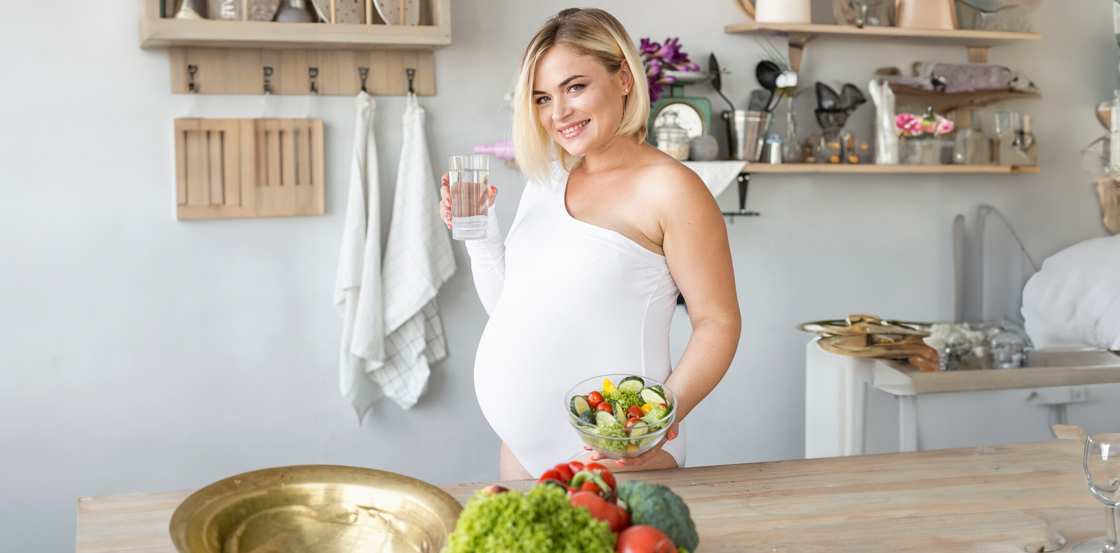Post link copied to clipboard!

Pregnancy is a time of joy and excitement. It is crucial to your health and the health of your growing baby. One of the most essential aspects of a healthy pregnancy is maintaining a proper diet that provides nutrients and nourishment to your little one from conception.
You can start your journey to motherhood on the right path with Pre-pregnancy health check services by Top Gynaecologists London. In this article, let’s explore the best foods to eat during pregnancy, ensuring you and your baby stay happy and healthy throughout this incredible journey.
During pregnancy, a balanced diet is essential to cater to your specific needs. While there is no one-size-fits-all meal plan, incorporating a variety of nutrient-rich foods will address common pregnancy symptoms, like nausea, vomiting, constipation, and heartburn, while supporting your baby’s growth and development.
Vegetables are a powerhouse of essential nutrients. They are low in fat, calories, and cholesterol while rich in fibre, vitamins, and minerals. Leafy greens, like spinach and kale, are excellent sources of folate, crucial for reducing the risk of neural tube defects during fetal development. So get creative and add vegetables to your diet in diverse forms, from salads to smoothies, for a healthy and delicious pregnancy.
Proteins play a vital role in your baby’s growth and development, supporting the formation of organs and tissues. Include lean meats, poultry, fish, eggs, nuts, beans, and tofu in your meals to ensure your baby’s healthy brain and heart development.
Whole grains like brown rice, whole-wheat pasta, cereals, and oatmeal are rich in fibre, iron, B vitamins, and folic acid. These nutrients are essential for your baby’s physical development and can help prevent discomforts like constipation and haemorrhoids during pregnancy.
Fruits are a delightful addition to your pregnancy diet. They offer essential nutrients, curb sugar cravings, and keep you and your baby healthy. Remember to rinse fruits and opt for fresh fruits over juices to avoid excessive sugar intake.
Dairy products are excellent sources of calcium and protein, paramount for your baby’s bone development. Opt for low-fat, pasteurised dairy products like cheese, yoghurt, and milk to ensure you and your baby stay healthy and safe from infections.
Healthy fats and oils are essential for your baby’s brain and eye development. Consume plant oils like olive, canola, or safflower in moderation, limiting your daily intake to six teaspoons. Avoid excessive solid fats like lard and butter to maintain a healthy weight during pregnancy.
Water is a magical elixir, benefiting your overall health, including pregnancy. Stay hydrated to alleviate pregnancy symptoms like morning sickness and nausea, and avoid energy drinks and excess caffeine. And, of course, avoid alcohol entirely for a healthy baby.
Remember, each pregnancy is unique, and your dietary needs may change from one pregnancy to another. Seeking professional assistance, such as a prenatal nutritionist or care specialist, can provide valuable guidance and support throughout your pregnancy journey. Further, consider the following aspects for a healthy and safe pregnancy:
Your health and well-being during pregnancy are paramount, and the food you eat plays a significant role in nurturing your baby’s growth and development. Ensure a healthy and happy pregnancy by strictly adhering to a balanced and nutrient-rich diet. You can prepare for a healthy pregnancy with our cutting-edge preconception check, tailored to your unique needs.
Absolutely! Fruits are a vital part of a healthy pregnancy diet. Just ensure you wash them thoroughly and avoid juices with added sugars.
No, healthy fats and oils are beneficial for your baby’s development. Stick to plant oils and consume them in moderation.
We recommend drinking at least 8-10 cups (64-80 ounces) of water daily to stay adequately hydrated.
Limit caffeine intake during pregnancy, so switch to fruit drinks and juices instead of soda. However, water should be your primary beverage.
No. You should strictly avoid alcohol during pregnancy as it can harm your baby’s health.